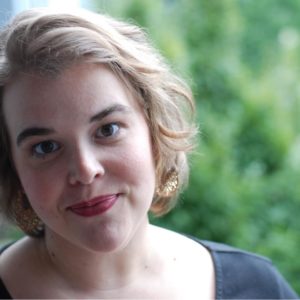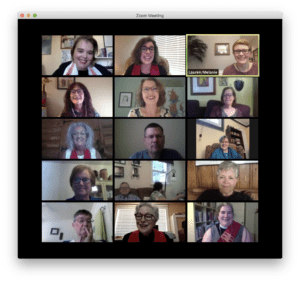I have been ordained online twice now. The first time didn’t stick, as it happened after a night on Bourbon Street during my rowdy years. The details of my first online ordination are awash in a wave of cheap hurricanes, but I know I was pushed to online ordination as an attempt to escape some kind of mischief I had stumbled into on Bourbon Street.

Ashley Robinson
Last Sunday, I gathered with more than a hundred of my friends and family from all over the world for my ordination on Zoom — an online ordination that is much more likely to stick. My beloved church home, Oakhurst Baptist Church, ordained me to the gospel ministry after months of prayerful discernment, mentoring, learning and challenging my call to ministry.
Through this discernment process I solidified my belief that sacred moments can happen anywhere and that I want to be part of a ministry that pushes boundaries. I just didn’t imagine that those sacred moments would happen on Zoom, launching me straight into the wilderness of ministry in the midst of a global pandemic.
My ordination service was affirming, joyful, raucous and glittery, just like I imagined, even though it happened over Zoom. Leading up to my ordination day, though, as it became more apparent that the COVID curves were not flattening enough for us to physically gather for a service, I spent some quality time in my weeping chair mourning the loss of tangible closure with my beloved community. You see, along with being ordained, I am also preparing to move from Atlanta to Dallas to begin an exciting new adventure — all without being able to be physically present with my beloved friends and family, because of COVID-19 and the social distancing restrictions in place.
 When I realized how much was changing, I grieved the loss of what I had imagined for myself, of familiarity, of routine. I wept when I realized that when we engaged in the ritual of the laying on of hands that I wouldn’t get to feel my Dad’s hands — strong, stubby hands that I inherited — on my shoulder.
When I realized how much was changing, I grieved the loss of what I had imagined for myself, of familiarity, of routine. I wept when I realized that when we engaged in the ritual of the laying on of hands that I wouldn’t get to feel my Dad’s hands — strong, stubby hands that I inherited — on my shoulder.
I laughed through those tears when I realized that my Mom probably would have offered a blessing that could rival a Steel Magnolias monologue and my Dad probably would have had to drag her away. In my imagination, I heard the creaking of the floor of the sanctuary and smelled the forbidden incense of my very best friend’s third layer of too-strong perfume. I closed my eyes and heard familiar singing voices in our congregation that always stuck out above the rest, some like angels, some like geese, but all holy. I convinced myself through my mourning and my misery to lower my expectations.
I presume that lowered expectations are part of my coping arsenal to get through this pandemic wilderness. In fact, I have been telling folks who were skeptical of Zoom services to lower their expectations, too, because the beauty of Zoom is that you can connect with your community in real time, and it is also wildly imperfect. I also quickly assured everyone that Oakhurst had done a great job of making church on Zoom engaging and worshipful.
“What you have to realize,” I told my finicky organist friend, “is that on Zoom you can either see and engage the congregation or you can have flawless timing and execution for the entire service, but you can’t have both. And sometimes a cat will mute the hymn leader.”
What I quickly learned in my ordination service is that having lowered expectations for navigating through this time is certainly one understandable way to survive. But, like most people wandering through a wilderness, I was shortsighted.
“I did not get to feel my parents’ hands on my shoulders, but I got to steady my nephew’s shoulders as he nervously read Micah 6:6-8.”
Before the service began, I scrolled through the attendees as the worship leaders were going through sound check procedures. I saw faces of childhood friends, professors, college friends from all over the country. My parents watched from two states away, (and I’m not entirely sure my mom knew she was muted the entire time.) I did not get to experience this ordination service physically surrounded by all of my family and friends like I had hoped, but I got to experience the day surrounded by my sister and her family in her home. I did not get to feel my parents’ hands on my shoulders, but I got to steady my nephew’s shoulders as he nervously read Micah 6:6-8.
My deflated hope really found life when I scrolled to the last page of Zoom attendees and saw my dear friend who is currently serving in North Africa as CBF field personnel. I realized then that if it weren’t for this service being held on Zoom, she would not have been able to attend.
As the worship leaders began the service, all speaking from different parts of my life, I was reminded how grateful I was to have the gift of technology in these uncertain times. When Molly Marshall offered a reflection during the service, she challenged us to create a church with “permeable boundaries.” I immediately thought of the physical building where Oakhurst Baptist Church typically meets.
“What I discovered in the midst of this life-giving, affirming ordination service was that instead of lowering my expectations, perhaps I should try broadening my expectations.”
On my first visit to Oakhurst, several years ago now, I was struck by two words on the simple sign hanging on a nondescript red brick building. “Oakhurst Baptist Church meets here.” The words “meets here” told me this congregation was committed to something more than just building and grounds committees and Main Street marquees.
I have since learned that Oakhurst understands the importance of permeable boundaries. In a moment where we are all floundering in the wilderness, wondering when to return to a physical church building, or how life-giving it is to worship from home together, Oakhurst has operated with permeable boundaries, and for that, I am grateful.
What I discovered in the midst of this life-giving, affirming ordination service was that instead of lowering my expectations, perhaps I should try broadening my expectations. I have a hunch that we are just barely into this wilderness of a pandemic. I highly recommend finding a quality weeping chair for moments when you need to mourn what has been lost — and a solid desk to drop your head upon when your expectations sink lower and lower.
We must also leave room, though, to broaden our expectations, because we are not going to be able to go back to where we were before, and it will take more than a shortsighted leadership to get us where we are going.
Ashley Robinson most recently served as volunteer and development director for Lost-n-Found Youth, an Atlanta nonprofit that serves homeless LGBTQ youth. She previously served as executive assistant for Baptist Women in Ministry and as minister of music and administration at Decatur United Church of Christ in Decatur, Ga. She’s a veteran writer and blogger and on Aug. 1 will become a pastoral resident at Wilshire Baptist Church in Dallas. She is a May 2020 graduate of Central Baptist Theological Seminary.
